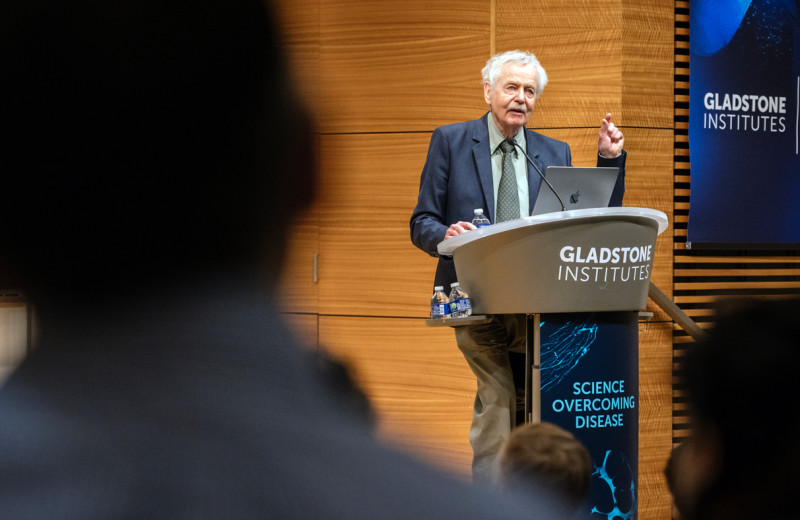Gladstone NOW: The Campaign Join Us on the Journey✕

SAN FRANCISCO—July 15, 2012—Lennart Mucke, MD, who directs neurological research at the Gladstone Institutes, has received the Khalid Iqbal Lifetime Achievement Award for his exceptional contributions to Alzheimer's disease research. The Alzheimer's Association presented the award to Dr. Mucke today at the 2012 Alzheimer's Association International Conference (AAIC) in Vancouver, Canada.
Dr. Mucke has spent most of his career uncovering the molecular and cellular mechanisms that cause memory loss and behavioral abnormalities in Alzheimer's disease and related conditions. For example, he and his colleagues showed that amyloid-beta, apoE4 and tau—three proteins closely linked to the development of Alzheimer's—can impair cognitive functions by impeding the communication among brain cells and disrupting the fine balance between excitation and inhibition that is required for the proper function of neural networks. Most importantly, Dr. Mucke has identified new therapeutic targets and experimental strategies to block these disease-causing processes and to make the brain more resistant to disease.
“Dr. Mucke is making tremendous strides in the advancement of Alzheimer's research,” said William Thies, PhD, who is the Alzheimer's Association's chief medical and scientific officer. “The passion and dedication shown by Dr. Mucke and others in this field will hopefully bring us closer to a much-needed cure for the Alzheimer's epidemic.”
Alzheimer's disease affects an estimated 5.4 million people in the United States. If current trends continue, this number may triple by 2050. And yet no approved drugs exist to prevent, halt or reverse this debilitating disease—which robs people of memory, other critical brain functions and, ultimately, their life. Dr. Mucke expects that an effective Alzheimer's solution will include multiple therapies to address the numerous proteins implicated in the disease—including amyloid-beta, apoE4 and tau—in much the same way that hypertension, cancer and severe infections often require treatment with combinations of different remedies.
“I am deeply honored to receive this Lifetime Achievement Award,” said Dr. Mucke, who is also a professor of neurology and the Joseph B. Martin Distinguished Professor of Neuroscience at the University of California, San Francisco, with which Gladstone is affiliated. “We have made enormous strides towards understanding the complexities of Alzheimer's. There is considerable work yet to be done—but I believe we are closer than ever to preventing, treating and ultimately overcoming this devastating disease.”
Before joining Gladstone in 1996, Dr. Mucke was an associate professor at The Scripps Research Institute. He has received numerous honors and awards, including the Zenith Award from the Alzheimer's Association, the MetLife Foundation Award for Medical Research and the Potamkin Prize from the American Academy of Neurology. Dr. Mucke is a member of the American Neurological Association, the Association of American Physicians and the Dana Alliance for Brain Initiatives. He serves on the National Advisory Council on Aging for the National Institutes of Health, a Medical and Scientific Advisory Council of the Alzheimer's Association and the Senate of the German Center for Neurodegenerative Diseases.
About AAIC and the Khalid Iqbal Lifetime Achievement Award
The Alzheimer's Association International Conference (AAIC) is the world's largest conference of its kind, bringing together researchers from around the world to report and discuss groundbreaking research and information on the cause, diagnosis, treatment and prevention of Alzheimer's disease and related disorders. The Khalid Iqbal Lifetime Achievement Award, established to honor AAIC co-founder Khalid Iqbal, PhD, recognizes scientists who have made extraordinary achievements in advancing Alzheimer's research.
About the Alzheimer's Association
The Alzheimer's Association is the world's leading voluntary health organization in Alzheimer's care, support and research. Their mission is to eliminate Alzheimer's disease through the advancement of research, to provide and enhance care and support for all affected, and to reduce the risk of dementia through the promotion of brain health.
About the Gladstone Institutes
Gladstone is an independent and nonprofit biomedical-research organization dedicated to accelerating the pace of scientific discovery and innovation to prevent, treat and cure neurological, cardiovascular, and infectious diseases. Gladstone is affiliated with the University of California, San Francisco.
Support Discovery Science
Your gift to Gladstone will allow our researchers to pursue high-quality science, focus on disease, and train the next generation of scientific thought leaders.
A Sculptor of Modern Regenerative Medicine
A Sculptor of Modern Regenerative Medicine
Among his myriad accomplishments, Rudolf Jaenisch—winner of the 2025 Ogawa-Yamanaka Stem Cell Prize—was the first to demonstrate the potential of induced pluripotent stem cells to treat disease.
Awards Ogawa Stem Cell Prize Profile Regenerative Medicine Stem Cells/iPSCsSix Gladstone Scientists Named Among World’s Most Highly Cited Researchers
Six Gladstone Scientists Named Among World’s Most Highly Cited Researchers
The featured scientists include global leaders in gene editing, data science, and immunology.
Awards News Release Corces Lab Doudna Lab Marson Lab Pollard Lab Ye LabBringing Modern Science to Vitamin Biology: Isha Jain Wins NIH Transformative Research Award
Bringing Modern Science to Vitamin Biology: Isha Jain Wins NIH Transformative Research Award
Leveraging modern scientific tools and techniques, Jain intends to transform our understanding of the critical roles that vitamins play in health and disease.
Awards News Release Cardiovascular Disease Jain Lab Metabolism



